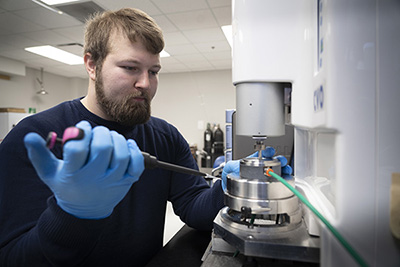Leslie Bottorff Fellow Matt Arkenberg
Leslie Bottorff Fellow Matt Arkenberg
For Matt Arkenberg, the steps from a small Indiana farm town toward an envisioned career in the biotech industry have taken a complicated, dynamic path embracing diverse academic resources and laboratory work on investigating an alternative to traditional insulin treatments for diabetes. He is now pursuing his PhD from Purdue's Weldon School of Biomedical Engineering and is working with a distinguished team of mentors headed by Chien Chi Lin, associate professor of biomedical engineering at the Indiana University-Purdue University Indianapolis campus.
Matt is supported by a Bioengineering Interdisciplinary Training in Diabetes Research grant from the National Institutes of Health and the Innovation for Clinical Translation (ICT) Fellowship jointly funded by the Purdue College of Engineering and Indiana University School of Medicine.

These prestigious fellowships help Matt continue cutting-edge efforts with polymeric biomaterials to facilitate transplant survival and restoration of normal blood glucose levels in type 1 diabetes patients. He began this research after earning dual degrees as an undergraduate - in chemistry from Butler University and biomedical engineering from IUPUI - and advancing to an IUPUI master's degree in biomedical engineering, which he received in 2018.
"We're creating a material that will reduce inflammation and immune rejection when pancreatic islets, which contain cells involved in insulin production, are transplanted into diabetic animal models," Matt says. He develops 3-D cell culture platforms to investigate islet biology and promote cell survival and function. His lab work involves the development of materials, while his interest in the clinical translation, whereby the materials can be made part of the transplant process, prompts his work with islet experts at IU School of Medicine.
And his education isn't stopping there. Matt received an overview of the technological challenges related to diabetes during a workshop hosted by the medical school. He will receive updates on diabetes research in mammals at the Purdue's College of Veterinary Medicine. Entrepreneurial and regulatory affairs courses at Purdue's Krannert School of Management will teach him strategies for improved translation - or transition to clinical use - of the next-generation polymer materials. In teamwork with Krannert MBA students, he'll "engage in defining value proposition, customer base, and commercialization for the innovative technology," as his mentor Dr. Lin describes the PhD journey.
The vision of substantively different diabetes treatments still faces a long road of combined learning at the biochemical, clinical and materials levels, but Matt might very well be fostering that success. "I'm considering pursuing a career in industry that involves novel engineering solutions to biological problems," he says, although he also enjoys his ventures in lab research and teaching.
One thing is certain for this student who began with a love of science and an interest in medicine, he believes he makes an invaluable contribution to patient care as an engineer. "Engineers think uniquely," he explains. "The training and mindset toward problem-solving in engineering programs is different from medical or clinical research." The "shared exchange" of these different perspectives is the crux of the Purdue College of Engineering - IU School of Medicine ICT program in which he participates.
Matt's curiosity in tapping the local resources doesn't stop at campus boundaries. "My wife and I like to try all the unique experiences Indy and West Lafayette have to offer," he says. "We go to concerts, try new restaurants, and find parks around Indiana to do hiking and camping." But the "end goal" he has in mind is answering the many questions associated with tissue engineering and biomaterials science as they relate to direct patient care.